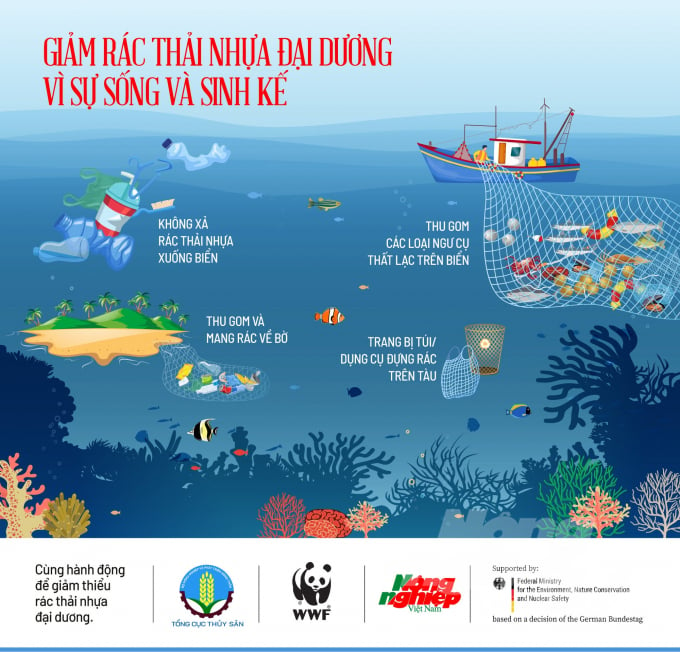November 28, 2025 | 03:14 GMT +7
November 28, 2025 | 03:14 GMT +7
Hotline: 0913.378.918
November 28, 2025 | 03:14 GMT +7
Hotline: 0913.378.918
Plastic pollution has reached enormous scale worldwide and had serious impact on the marine environment and social life. About 12 million tons of plastic are dumped into the ocean every year, with the largest loss going to the Indian and Pacific Oceans, where many coastal lands and countries are located. And Vietnam is not an exception to the negative impacts of ocean plastic waste.
Due to a dynamic economy, rising living standards and changing consumption patterns, Vietnam's plastic consumption is increasing annually at 16% - 18% per year from 2010 to 2020. In 2015, it is estimated that each Vietnamese person consumed up to 41kg of plastic in 2019.
The proportion of plastic in urban waste in Vietnam is also on the increase. Although there have been improvements, a large amount of plastic is still not collected and burned open-air or discharged into the environment, causing harm to the terrestrial and marine environment.
The need for a transition to more sustainable packaging and more efficient plastic waste management has been highlighted by the Government, the Ministry of Agriculture and Rural Development (MARD), the General Deparment of Fisheries and the World Wildlife Fund in Vietnam (WWF-Vietnam) has established action programs to call on the community, especially fishermen, to have responsibility in using and preserving plastic equipment; When disposing of waste, it should be collected and brought to the shore for treatment, helping to make the sea cleaner.

The World Wide Fund in Vietnam (WWF-Vietnam) cooperates with many agencies to reduce ocean plastic waste for life and livelihood. Photo: Hai Nam.
A clean marine environment is a beautiful ecosystem, a safe and abundant source of seafood, helping fishermen have bountiful fishing crops. Understanding the types of ocean plastic waste, its harmful effects on the environment, health and especially the livelihoods of fishermen and aquaculturists are essential. Guidance to reduce plastic waste in daily life as well as in fishing and aquaculture activities, with an aim to build a clean environment for fish and shrimp, tourism development and safety for people.
To do so, the social community needs to take action, but the most important thing is the consciousness of each person, in which fishermen make up the majority.
WWF- Vietnam urges fishermen to:
* Fishermen should adopt appropriate practices in responsible fishing, including compliance with space/time constraints and shared use of stationary/fixed fishing gear areas to avoid conflicts over the use of the water surface area between fishing gear and vessels; marking fishing gear with full details of ownership and placing the markings in a conspicuous place on the fishing gear; Dispose of expired and damaged fishing gear in suitable locations and in accordance with the regulations of each construction/port.
* Report to authorities when fishing gear is lost and retrieve it if the fishing gear is still usable. Fishermen should bring salvaged fishing gear on board and train crew members on safe fishing methods; immediately report on lost fishing gear to relevant fisheries management agencies, collect all types of fishing gear lost at sea; and participate in the regional Ocean Plastic Waste Collection programs to help the marine environment and its own fishing grounds.
* Share expertise to jointly prevent and reduce fishing gear left in the ocean. Fishermen should participate in the improvement of fishing gear and share practical knowledge to jointly prevent the impact of fishing gear left in the ocean; participate in training novice fishermen on how to prevent the loss of fishing gear, explaining the reasons and the benefits to their profession; collaborate in implementing programs to retrieve fishing gear left in the ocean and contribute to raising awareness on the impact of fishing gear left in the ocean.
Translated by Nguyen Hai Long

(VAN) According to Mr. Vo Minh Thanh, Director of the Tay Ninh Department of Agriculture and Environment, Resolution 57 has created a new development pathway for the locality, shifting from traditional toward modern agriculture.
/2025/11/26/4909-2-154329_878.jpg)
(VAN) Pearl grouper farming in HDPE cages not only delivers economic efficiency but also contributes to protecting the environment, creating jobs, and promoting marine-based experiential tourism.

(VAN) The model of making a living under the forest canopy through the agroforestry system in Van Son commune, Bac Ninh province, is expected to generate an annual income of approximately VND 30 million/ha.

(VAN) Many enterprises in Can Tho are harnessing natural energy and reducing greenhouse gas emissions in their production processes, thereby contributing to the promotion of a sustainable green transition.
/2025/11/24/3536-2-112800_176.jpg)
(VAN) Dong Nai now has tens of thousands of hectares of forests certified for sustainable management, and this area will continue to be expanded in the coming period.

(VAN) Vinh Ha hamlet (Dai Xuyen commune, Hanoi) is shifting away from small-scale farming as households adopt bioscurity into their breeder chicken models.

(VAN) Heavy rains make aquatic species more vulnerable to disease. Proactive water management and high-tech systems help farmers prevent outbreaks and protect yields.